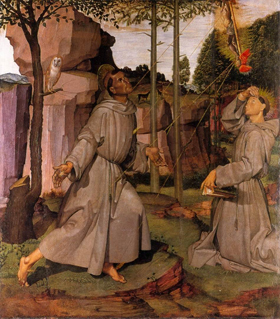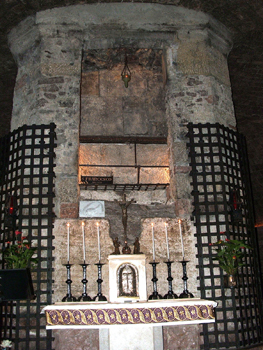For Sunday July 31, 2016
Lectionary Readings (Revised Common Lectionary, Year C)
Hosea 11:1–11 or Ecclesiastes 1:2, 12–14; 2:18–23
Psalm 107:1–9, 43 or Psalm 49:1–12
Colossians 3:1–11
Luke 12:13–21
This past Saturday my wife and I returned from walking the "Way of St. Francis" in Italy — 350 miles in 28 days of walking, from Florence to Assisi to Rome. Like our pilgrimages in Spain and France, the walk was many good things — being together, physical exercise, getting away from our ruts and routines, traveling in a country we had never seen, and meeting people from all over the world.
This year included a spiritual-historical dimension — to try in some small but extended way to consider the life and legacy of St. Francis of Assisi (1181/2–1226).
Francis's family was wealthy but not aristocratic. In 1205, he renounced family and wealth in favor of a vagabond life as a lay penitent, centered around serving lepers, manual labor repairing churches, and fervent devotion to the Eucharist.
In 1208, two followers joined him, and the three of them sought priestly advice on their "form of life." On April 16, 1208 the priest opened the missal to three random passages that would later define the Franciscan Order: go and sell all you have, take nothing for the journey, deny yourself and follow Jesus.
Francis lived the gospel for this week: "Watch out!" said Jesus. "Be on your guard against all kinds of greed."
To punctuate his point, Jesus told the parable of "the rich fool" who built bigger barns for his increasing wealth. His smugness has passed into our everyday lexicon: "Eat, drink, and be merry." But he died suddenly, left his wealth to others, and never learned to be "rich towards God."
Greed is the desire to possess more than we need. We normally associate greed with money, as did Jesus. But we can be greedy for many things — for food, fame, sex, or power. Christians have always identified greed (Latin, avaritia) as one of the seven deadly sins.
There's a horrible paradox in greed — it's never satisfied by what it desires. Rather, the opposite is true. "When money increases," observed John Cassian (b. 360), "the frenzy of covetousness intensifies." Greed is insatiable: "It always wants more than a person can accumulate."
 |
|
Oldest known portrait of St. Francis, 13th century.
|
"Don't be afraid," said Jesus: "God knows what you need." He then doubles down on his message. He invites us to oppose greed with renunciation: "If you want to be perfect, go, sell your possessions and give to the poor, and you will have treasure in heaven. Then come, follow me."
If you believe Jesus that “it is difficult for a rich person to enter the kingdom of God,” or Paul that "the love of money is a root of many evils," then renunciation isn't as bizarre as it sounds.
Nor is renunciation a utopian ideal or unattainable standard. Francis is hardly an exception. Many Christians have lived this ideal, most notably the monastic communities. Nonetheless, we've never prescribed the ideal for everyone, and for good reasons.
The first believers "had everything in common. Selling their possessions and goods, they gave to anyone as he had need. No one claimed that any of his possessions was his own, but they shared everything they had. There were no needy persons among them. From time to time those who owned lands or houses sold them, brought the money from the sales and put it at the apostles feet, and it was distributed to anyone as he had need."
Financial generosity was combined with social generosity. Personal piety and social justice weren't separated. The early believers subverted normal social hierarchies of wealth, ethnicity, religion, and gender in favor of a radical egalitarianism before God and with each other. In the words of this week's epistle, "Here there is no Greek or Jew, circumcised or uncircumcised, barbarian, Scythian, slave or free, but Christ is all, and is in all."
 |
|
The Stigmata of Saint Francis by Bartolomeo della Gatta, tempera on wood, c. 1487.
|
As the decades rolled by and the movement expanded, grappling with greed became more nuanced.
In his masterful study Through the Eye of a Needle; Wealth, the Fall of Rome, and the Making of Christianity in the West, 350–550 AD (2012), Peter Brown of Princeton documents the evolving attitudes and practices of Christians regarding wealth. He rejects two common myths. First, that of "the primal poverty of the early Christians." That was true for some, but not for all.
And second, although the church gained new privileges under Constantine, the emperor didn't usher in a time of new wealth for the church. That didn't happen until the year 370 or so. Until then, the "mediocres" or "in-betweeners" were the church's biggest supporters — the "middling people" between the super rich and the oppressed poor, artisans, small farmers, small town clerics, tradesmen, and minor officials. Brown describes these people as "the solid keel of the Christian congregations through the fifth century."
There were no easy answers to the hard sayings of Jesus. Brown documents the various ways believers grappled with greed, from radical renunciation by the super rich, the "anti-wealth" of the ascetics, care of the poor, the everyday generosity of ordinary believers, and, finally, the clerical stewardship of massive wealth as God's providential gift.
As with food and fasting, although all believers have a single goal, like the avoidance of gluttony and the cultivation of self-control, it's impossible to commend a single rule to reach that goal due to our different personal circumstances — age, stage in life, health, family matters, etc. So, we don't prescribe total renunciation of wealth, sex or food for every Christian. That's a voluntary and personal choice. After all, many wealthy women supported Jesus and the early monasteries. Joseph of Arimathea was a wealthy man who buried Jesus.
Greed is psychologically complex. Cassian observed how monks who had renounced great wealth got angry over a small sum or a lost book. Monks who practiced renunciation agreed that the possession of money wasn't the ultimate problem. What mattered most was one's disposition, desires, or attitude. The renunciation of money is an outward sign of the more important inward struggle.
 |
|
The final resting place of St. Francis in Assisi.
|
Saint Hesychios of the eighth century put it this way: "He who has renounced such things as marriage, possessions and other worldly pursuits is outwardly a monk, but may not yet be a monk inwardly. Only he who has renounced the impassioned thoughts of his inner self, which is the intellect, is a true monk. It is easy to be a monk in one's outer self if one wants to be; but no small struggle is required to be a monk in one's inner self."
Similarly, Maximos of the seventh century: “the war which the demons wage against us by means of thought is more severe than the war they wage by means of material things.”
Battling greed is no easier for a monk or more difficult for an investment banker. Jesus's call to renounce greed is for all of us, not just a spiritual elite. How you do that is a personal and complex spiritual discipline based on God's unique call on your life.
St. Francis wasn't an inimitable figure who transcended history. He was a normal human being who grappled deeply with the invitation of Jesus to "give all, take nothing, and embrace the cross." And that's the conversation not just of a summer walk, but of an entire lifetime.
Image credits: (1) Wikipedia.org; (2) Wikipedia.org; and (3) Wikipedia.org.





